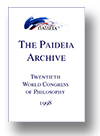|
21.
|
The Paideia Archive: Twentieth World Congress of Philosophy:
Volume >
32
Elena Tatievskaia
Russell on the Structure of Propositions
abstract |
view |
rights & permissions
| cited by
The comparison of Russell's views on semantics before 1905 with the theory of Frege allows one to expose the common sources of their interest in semantical problems and the specific character of their examination. During the investigation of the principles of mathematics and elaboration and realization of the program of logicism, questions regarding the logical structure of mathematical and logical propositions as well as the relation of linguistic signs and logical forms arise for both authors. Russell assumes the possibility of two kinds of analysis of the structure of propositions. One of them - by means of propositional functions - is analogous to Frege's analysis. But at first it is not accepted by Russell as fundamental. He prefers another kind of analysis, namely that by means of relations. This preference is conditioned in the first place by the intensional interpretation of propositions and in the second place by his ontological and epistemological views. These are based on the theory of external relations which implies the acceptance of real existence of particulars and of the specific relation of predication, resulting in the consideration of predicates as terms.)
|
|
|
22.
|
The Paideia Archive: Twentieth World Congress of Philosophy:
Volume >
32
Åsa Maria Wikforss
Social Externalism and Non-Empirical Errors
abstract |
view |
rights & permissions
| cited by
I consider an individualist reply to Burge's well-known anti-individualist thought experiment. It is commonly assumed that the individualist has one of two options: accept that reference is socially determined and opt for a bifurcation of content (the internalist option); or reject the conclusions of the thought experiment and insist that Burge's patient uttering "I have arthritis in my thigh" has her or his own "arthritis"-concept and utters a true belief. I suggest that neither of these options is very attractive and thus the individualist seems faced with a dilemma. However, Burge's thought experiment rests on problematic philosophical assumptions that the individualist need not accept. One such assumption is that the speaker uttering "I have arthritis in my thigh" makes a non-empirical error. This assumption, as Burge himself makes clear, is crucial if the thought experiment is to go through. So, Burge presents an account of the notion of a "non-empirical error" which is very problematic and fails to support the conclusions of the thought experiment. Once this account is questioned, the individualist can reject the claim that meaning is determined by the speaker's social environment without falling into the dilemma.
|
|




